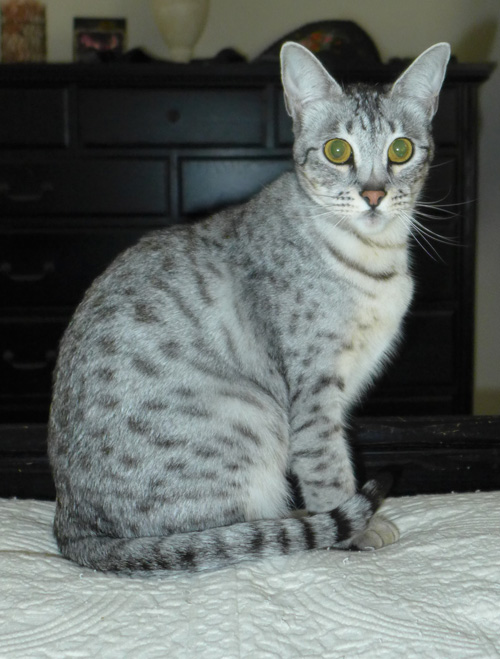Safety Issues
With all that energy, curiosity, and intelligence, they have an extra propensity for getting into trouble and mischief. Therefore it’s essential to savannah-proof your entire home for safety. For instance, savannahs may play with or chew on plants, so plants that are toxic to cats (lillies!!) should be removed from the household or put in a cat inaccessible room.
Click on the buttons below to view our available Savannah kittens today!
You will probably want to put away or secure any breakable objects (vases, knick-knacks, collectibles) before they are broken. Savannahs are especially prone to chewing on their toys and other loose objects and may ingest things that are dangerous or lethal to them (string, rubber bands, toothfloss, thread, etc.). Dog toys are more durable than typical cat toys, but some toys should never be left with them unsupervised. Trash cans should have lids or should not be accessible or tippable, as they will learn to look in them for ‘fun’ things to play with such as Qtips, dirty Kleenex, paper towels, tampons, crinkly plastic, etc. Toilet paper and paper towel rolls are fair game for shredding (keep them on lock-down), as is most important paperwork. I have had to explain to my students many times that my kittens shredded or punctured their exams/homework.
Because savannahs love to play in water, toilet lids should be kept down (no chemicals), and fish tanks well covered or protected. Because they enjoy high places, savannahs often try to play and walk on railings. In areas with high staircases, balconies, and lofts, they can fall off and seriously injure themselves. Precautions such as thick area rugs with extra padding, pet barricades, or static mats may be required to protect kittens and young cats from these dangers. Similarly, attics, basements, and garages may contain rafters, joists, exposed insulation and/or wiring, open walls or floors, chemicals, or small ingestible objects that pose many potential dangers.
When you have savannah kittens, it is a good idea to have a dedicated cat room in the house with food, water, toys, cat trees, cushy beds, etc., so there is a safe and comfortable place to put them when you go to work or bed, or when something disruptive is going on in the house (carpet cleaning, construction/remodeling, cat-unfriendly visitors, entertaining guests, new pet in the house, etc.). Adult savannahs get into varying degrees of trouble depending on age, personality, and whether or not they are bored/lonely or have playmates to keep them entertained.
Savannahs can be wonderful with children, however, children must be taught to be gentle and respectful toward animals and what is acceptable behavior. Children and animals should never be left unsupervised.
Similarly, savannah kittens must be discouraged from playing roughly with human hands or feet, so they will learn to play gently and not bite or scratch.
Savannahs should never be allowed outdoors unsupervised or unleashed. Secure outdoor wire enclosures complete with tops or screened porches are preferred, as they will jump, climb, or otherwise escape from most open-topped fences.
Savannahs are great with other cats or dogs. In fact, because savannahs are so social and playful, you may need to have another cat or dog as a companion for your savannah, so they don’t get too lonely when you can’t be with them and absorb some of that playful energy. Some savannahs simply do not make good solitary pets for this reason and need a companion or they get depressed, and/or may act out in a negative way. However, like most cats, savannahs are instinctive predators of rodents, birds, fish, or other small animals. Some savannahs can be raised to get along with these small animals, however many will instinctively attack and kill them.

